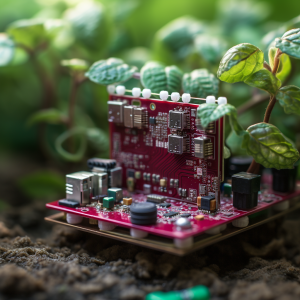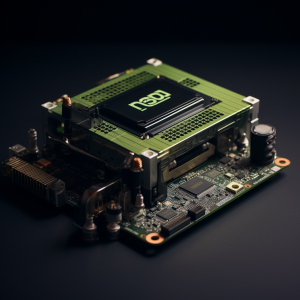
Raspberry Pi vs Nvidia Jetson Nano: Which is Better?
Global electronic component supplier AMPHEO PTY LTD: Rich inventory for one-stop shopping. Inquire easily, and receive fast, customized solutions and quotes.
What’s Raspberry Pi?

The Raspberry Pi is a series of small single-board computers developed in the United Kingdom by the Raspberry Pi Foundation to promote the teaching of basic computer science in schools. It's a credit card-sized computer that can perform nearly all of the functions of a desktop PC, including playing games, streaming HD video, and operating applications.
Features of Raspberry Pi
Small form factor: Raspberry Pi boards are simple to incorporate into a wide range of projects and applications due to their small size.
GPIO pins: Suitable for electronics and robotics projects, General Purpose Input/Output (GPIO) pins enable Raspberry Pi to communicate with and manage external gear.
Multiple connectivity options: Raspberry Pi boards usually come with Ethernet, Bluetooth, USB ports, HDMI output, and Wi-Fi to allow for networking and peripheral connections.
Expandable storage: MicroSD cards can be used for storage on the majority of Raspberry Pi models, giving users the flexibility to increase the available storage capacity as needed.
Software support: The Raspberry Pi is compatible with a wide range of programming languages and software programs, and it can run on several operating systems, such as Raspbian (based on Debian), Ubuntu, and others.
What is the Nvidia Jetson Nano?

Similar to the Raspberry Pi, the Nvidia Jetson Nano is a credit card-sized computer made especially for artificial intelligence (AI) applications. It has greater memory and a quicker processor, which enable it to perform more complicated AI tasks.
Features of Nvidia Jetson Nano
AI-Focused: Tasks like image recognition, object detection, and machine learning are made possible by the robust GPU and software libraries.
High Performance: Suitable for demanding applications, it can easily handle complicated computational operations.
Developer-friendly: For seasoned developers, the CUDA programming environment opens up the Nano's full capabilities.
Raspberry Pi vs Nvidia Jetson Nano
Now, the ultimate showdown! Let's compare the two champions side-by-side to help you decide which reigns supreme for your quest:
|
Feature |
Raspberry Pi 4 Model B |
Raspberry Pi 3 Model B+ |
Raspberry Pi 2 Model B |
Nvidia Jetson Nano |
|
Processor |
Broadcom BCM2711, Quad-core Cortex-A72 (ARM v8) 64-bit SoC @ 1.5GHz |
Broadcom BCM2837B0, Quad-core Cortex-A53 (ARM v8) 64-bit SoC @ 1.4GHz |
Broadcom BCM2836, Quad-core Cortex-A7 (ARM v7) 32-bit SoC @ 900MHz |
Quad-core ARM Cortex-A57 @ 1.43 GHz |
|
GPU |
Broadcom VideoCore VI |
Broadcom VideoCore VI |
Broadcom VideoCore VI |
128-core Maxwell GPU |
|
RAM |
2GB, 4GB, or 8GB LPDDR4-3200 SDRAM |
1GB LPDDR2 SDRAM |
1GB LPDDR2 SDRAM |
4GB 64-bit LPDDR4 |
|
Storage |
microSD card slot |
microSD card slot |
microSD card slot |
microSD card slot, 16GB eMMC (developer kit) |
|
USB Ports |
2 × USB 3.0, 2 × USB 2.0 |
4 × USB 2.0 |
4 × USB 2.0 |
4 × USB 3.0 |
|
Networking |
Gigabit Ethernet, 802.11ac wireless, Bluetooth 5.0 |
Gigabit Ethernet, 802.11ac wireless, Bluetooth 4.2 |
10/100 Ethernet |
Gigabit Ethernet |
|
Operating System |
Raspberry Pi OS (Linux) |
Raspberry Pi OS (Linux) |
Raspberry Pi OS (Linux) |
Linux (Ubuntu-based JetPack SDK) |
|
Power Supply |
5V/3A DC via USB-C connector |
5V/2.5A DC via micro-USB |
5V/2.5A DC via micro-USB |
5V/4A DC via barrel jack |
|
GPIO Pins |
40-pin header |
40-pin header |
40-pin header |
40-pin header |
|
Dimensions |
85.6mm × 56.5mm |
85.6mm × 56.5mm |
85.6mm × 56.5mm |
100mm × 80mm |
Video related to Raspberry Pi vs Jetson Nano
How Raspberry Pi Works?
The Pi is equipped with a CPU, RAM, and storage (often a microSD card) under the hood. You can communicate with the Pi and manage its hardware, including keyboards, screens, and sensors, thanks to the operating system that runs on it. But its true magic lies in its:
Community: Vibrant and encouraging, a community of Pi aficionados provides important assistance via online resources, tutorials, and forums.
Remote Access: Your Pi is perfect for remote monitoring and control since it can be controlled remotely using SSH (Secure Shell) or VNC (Virtual Network Computing) from anywhere in the world.
Cloud Connectivity: To improve storage, processing power, and accessibility, connect your Pi to cloud services like Microsoft Azure or Google Cloud.
How to Use Nvidia Jetson Nano?
The Jetson Nano isn't just for seasoned developers. Here are some ways even beginners can explore its AI prowess:
Object Recognition: To create intelligent assistants or security systems, teach the Nano to identify items in pictures and videos.
Speech Recognition and Synthesis: You can add interactive components to your projects by using your voice to control gadgets or to make the Nano speak.
Machine Learning Projects: Using trained models or bespoke algorithms, create your own AI apps.
Remote Access and Monitoring: The Jetson Nano has the same remote access and monitoring capabilities as the Pi. Even if the Nano is far away, you can still control it from your computer using programs like SSH and VNC.
Connecting to the Cloud: By linking your Nano to cloud services, you can access even more power. This enables you to work on bigger and more intricate AI projects by providing you with access to more storage and processing power.
Where Raspberry Pi is Used?
Education: A great way to learn electronics, robotics, and coding in classrooms, colleges, and even your living room.
Hobbyist Projects: You can tinker with electronics, automate your home, build robots, or build retro game systems. The options are unlimited.
Budget-Conscious Applications: The Pi is a great option for small-scale deployments and personal projects since it offers great value for the money.
What is Jetson Nano Used for?
Autonomous Vehicles and Drones: These technologies provide real-time obstacle identification and navigation, acting as the brains behind flying robots and self-driving automobiles.
Intelligent Robots: Open the door to more sophisticated robotics applications by giving robots the capacity to see, comprehend, and respond to their surroundings.
Medical Imaging and Diagnostics: Use AI to precisely analyze medical images and data to help with early diagnosis and improved patient outcomes.
Where to Find Your Perfect Pi?
Finding your ideal Raspberry Pi model depends on your needs and budget. Popular options include:
Raspberry Pi 4: The current flagship model, offers excellent performance for most applications.
Raspberry Pi Zero: The Raspberry Pi Zero is the most economical Pi, making it ideal for small-scale projects with tight budgets.
Raspberry Pi Pico: A microcontroller board ideal for beginners and simple projects.
Where to Buy Jetson Nano?
Finding a Jetson Nano can be a challenge, but it's not impossible. Here are your options:
Official Nvidia Store: The most dependable source is the official Nvidia store, however, it frequently runs out of stock.
Authorized Retailers: Seek out respectable retailers of electronics that carry Nvidia products.
Online Marketplaces: When purchasing from merchants you don't know, exercise caution, read reviews, and confirm legitimacy.
Conclusion
In conclusion, the Raspberry Pi and Nvidia Jetson Nano are both potent instruments, but they serve distinct purposes. With its low cost, many uses, and intuitive interface, the Pi is a great choice for anyone looking to get started with technology. The AI winner, however, is the Jetson Nano, which provides unparalleled processing power and specialized tools for enthusiasts and developers. The option that gives you the most freedom to realize your original ideas is ultimately the best one. So pick your champion, go to work, and unleash your inner artist!
Related Articles
- ·Stratix 10 VS Stratix V: Which FPGA is Right for Your Next Project?
- ·Intel Xeon Platinum 8454H vs AMD EPYC: Which Reigns Supreme?
- ·A Deep Dive into the AMD EPYC 4564P Processor
- ·MSP430F5438A vs MSP430F5529: A Detailed Analysis of Their Capabilities
- ·Comparing MSP430F6659 and MSP430F5419A: Which One is Right for Your Project?
- ·Exploring the Features of MSP430F5529 and MSP430F5638 Microcontrollers
- ·Demystifying 20 Microcontroller Projects for Beginners
- ·Unveiling the Ultimate Guide to Microcontroller Programming
- ·4680 Battery: Unveiling the Power Potential of the Next-Gen Cell
- ·Exploring the Case Studies on Arduino Applications
